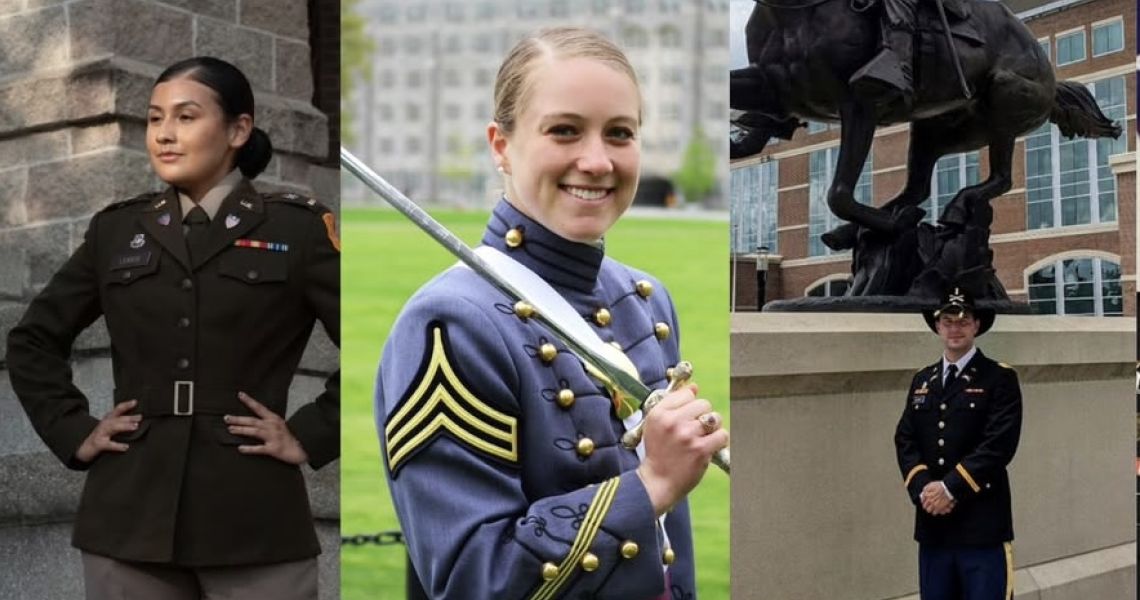Jessica Lemus (DPT ’26) has served as a member of the Virginia Army National Guard since 2022, while also earning her doctoral degree in physical therapy. During her undergraduate career, Lemus completed the Reserve Officers' Training Corps (ROTC) program at Virginia Commonwealth University before being commissioned as an Army Officer. Lemus decided to complete her service requirements and physical therapy school simultaneously, balancing her service as an officer for human resources in the National Guard with being a full-time student. Lemus claims that completing service and school at the same time, while challenging, has been very rewarding.
“The professors really care about my success within the program, and do their best to help me make it work. "It hasn’t been easy balancing studying and military obligations, but I was able to succeed with the support of my battalion and The George Washington (GW) Doctorate of Physical Therapy (DPT) faculty,” Lemus explained.
Two current first-year students, Spencer Pavia (DPT ’27) and Nathan Jackson (DPT ’27), served in the military prior to enrolling in physical therapy school. Both reflected on the journey that led them to GW DPT.
Jackson was commissioned as an Army Officer through Officer Candidate School before being stationed in Fort Stewart, Georgia to serve as a leader for a 30-soldier scout platoon. With the Russian invasion of Ukraine in 2022, Jackson and his platoon were deployed to Germany for six months to train alongside the United States military allies. Jackson returned to basic training as an Executive Officer, where he supported civilians in their transition to becoming soldiers.
Jackson recalls that time, where, “instead of being the one receiving orders, I was now responsible for logistics and resource management to support training.” Jackson’s role contained an unexpected connection to physical therapy; as he was responsible for overseeing resources for Holistic Health and Fitness, which included advanced physical therapy equipment.
Jackson noted that the skills he learned in the military translate to DPT school, stating, “the ability to build trust, stay adaptable, and lead with empathy applies just as much in healthcare as it does in the military.”
Pavia graduated from the United States Military Academy at West Point in 2019 and was commissioned thereafter as an Engineer Officer. Pavia shared, “In 2021, I had the unique opportunity to become a Mechanized Infantry Platoon Leader. The infantry branch I was assigned to did not allow women to be assigned there until 2017, and remains heavily male-dominated to this day. I was the first female leader for most of the 44 soldiers I led.”
When asked what advice she would offer to aspiring physical therapy students with a military background, Pavia encouraged students to take the plunge. “Getting out of the Army for a totally new career is daunting, but the military has prepared you with your work ethic, time management skills, and ability to get things done when the going gets hard,” she said.
Transitioning from being a Captain in the Army into physical therapy school was a challenge for Jackson, as the structure and clear hierarchy he was used to no longer existed. Jackson would advise others making a similar transition to “stay humble, be respectful, and maintain the strong work ethic the military instilled in you. That foundation will carry you far in school and beyond.”
Following graduation from physical therapy school, Pavia hopes to work at military-affiliated hospitals for the duration of her career. While Jackson does not plan to return to military service after graduation, he states that he is interested in working at a Veterans Affairs (VA) clinic. A trip to the Washington VA Medical Center as part of the first-year curriculum exposed Jackson to a new perspective that he was previously familiar with only as a patient. “Living in this area with so many Veterans, I know I’ll find meaningful ways to serve that community through my work as a physical therapist,” Jackson said.
Looking towards the future, Lemus has many interests at the intersection of physical therapy and military service. Lemus says, “I want to explore both civilian and military settings to identify current gaps in care, particularly related to pelvic health.” With an upcoming clinical experience at Alexander T. Augusta Military Medical Center at Fort Belvoir, Virginia, Lemus anticipates her path will become clear. “GW DPT has many faculty members who were previously in the military that continue to be very helpful in guiding my journey in the program,” Lemus says. Regardless of what direction she chooses, she knows she has the support of the GW DPT program behind her.
